The ADATA Ultimate SU750 1TB SSD Review: Realtek Does Storage, Part 1
by Billy Tallis on December 6, 2019 8:00 AM ESTAnandTech Storage Bench - Light
Our Light storage test has relatively more sequential accesses and lower queue depths than The Destroyer or the Heavy test, and it's by far the shortest test overall. It's based largely on applications that aren't highly dependent on storage performance, so this is a test more of application launch times and file load times. This test can be seen as the sum of all the little delays in daily usage, but with the idle times trimmed to 25ms it takes less than half an hour to run. Details of the Light test can be found here. As with the ATSB Heavy test, this test is run with the drive both freshly erased and empty, and after filling the drive with sequential writes.
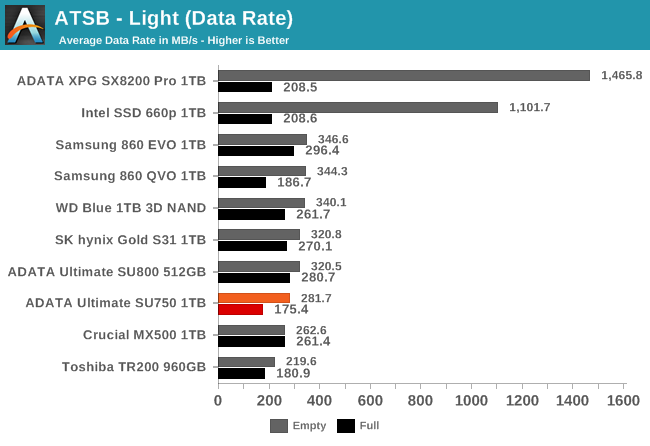
The ADATA Ultimate SU750 actually manages to outperform one of the mainstream SATA drives on the Light test, though that's more due to the Crucial MX500 misbehaving than the SU750 being fast. When the test is run on a full drive, the SU750 drops to last place, but isn't far behind the other two entry-level SATA drives.
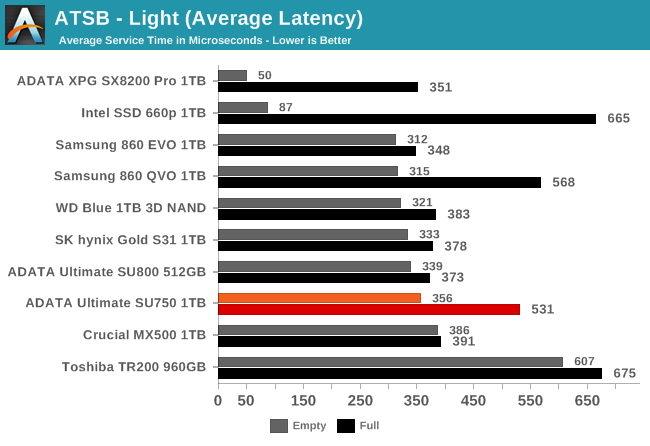
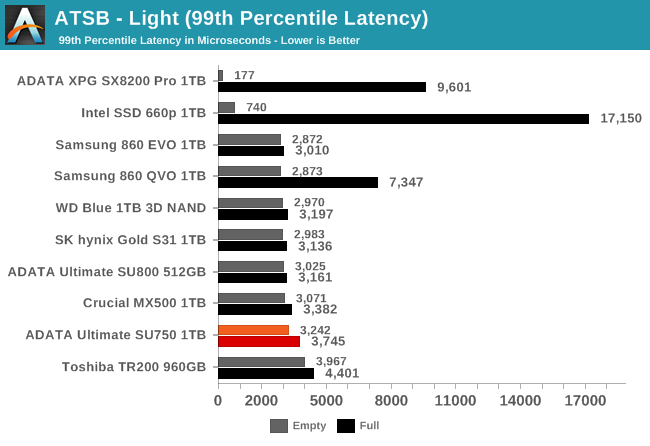
The average latency scores for the SU750 are fine when the Light test is run on an empty drive, and are at least better than the other entry-level drives for the full-drive test runs. The 99th percentile latency scores are similarly not too far behind mainstream SATA drives, and the full-drive latency doesn't have the QoS problems the Samsung 860 QVO experiences.
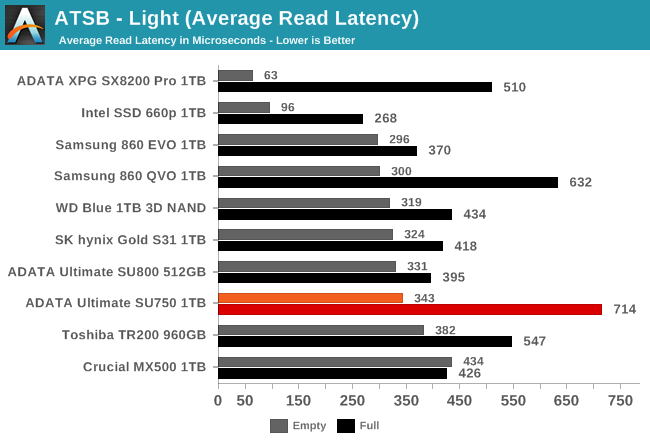
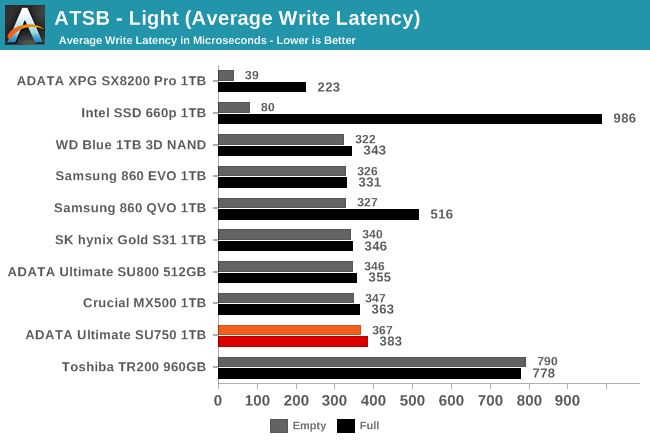
The SU750 has a bit of a problem with average read latency when the Light test is run on a full drive, but otherwise its average read and write latency scores are barely slower than typical mainstream SATA drives.
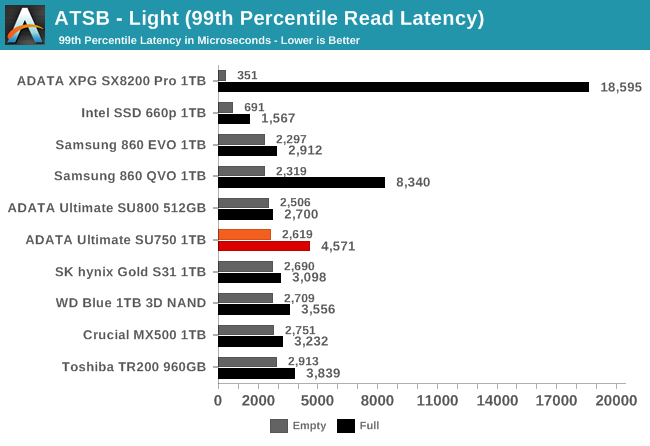
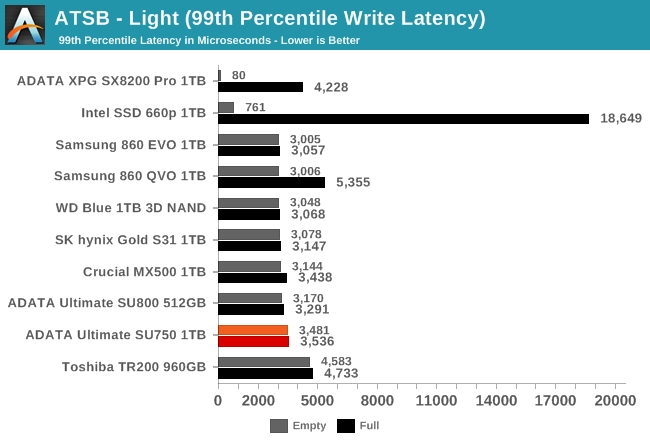
The 99th percentile read latency scores from the SU750 suffer a greater full-drive performance penalty than most other SATA drives experience, but nowhere near as bad as the 860 QVO. The SU750's 99th percentile write latency is fine for both empty and full drive test runs.
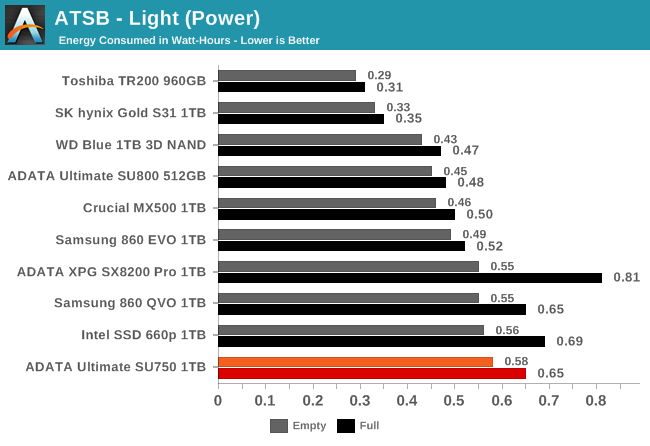
As usual, the SU750 has some of the highest energy usage scores, matched by the Samsung 860 QVO and the two NVMe drives. However, unlike the more difficult ATSB tests, the gap between the SU750 and the mainstream SATA drives is relatively small.










54 Comments
View All Comments
sonny73n - Friday, December 6, 2019 - link
Realtek does audioRealtek does networking
Realtek does storage
Debbie does Dallas
RadiclDreamer - Friday, December 6, 2019 - link
Realtek may do all of these things, but it does them all poorly.FunBunny2 - Friday, December 6, 2019 - link
"Realtek may do all of these things, but it does them all poorly."Debbie wasn't so hot either. :):)
boozed - Friday, December 6, 2019 - link
I don't know that I'd call them poor. Good value, reliable (in my experience) and good enough for the vast majority of users.Other options are available for enthusiasts.
eek2121 - Friday, December 6, 2019 - link
The trouble is that you are talking about a few dollars for a much faster and more power efficient drive. This controller appears DOA as it brings nothing unique to the table.Samus - Saturday, December 7, 2019 - link
With what Intel charges for network controllers, it’s astonishing Realtek is in business when you consider how superior an Intel NIC is while being a few dollars more. And wireless is a whole different story. I’d put Realtek at the absolute bottom of the list. Atheros/Qualcomm, Intel, Agere, Lucent, Broadcom, all have better reliability, support (which is shocking when you consider how vastly used Realtek products are) and generally - performance, than competing Realtek solutions.I think where Realtek scores is availability. Their volume shows commitment to OEM’s that require dependable shipping schedules. This can be as important is BOM pricing, and when you look at the numbers, it seems (and I’m speculating) Realtek designs products for volume production more than anything else. The incredibly low pin count and a 2 channel controller back this up. We are talking about possibly the most basic SATA SSD controller in production and that means they will be able to make a shitload of them really fast really cheap.
And unfortunately OEMs will bite because they know 90% of the people buying this crap don’t care about the inner margin performance of an SSD. Most people buy on price, reliability and warranty.
This shitty SSD May have all 3 bases covered considering the quality binning of Micron NAND.
close - Saturday, December 7, 2019 - link
"a few dollars more" adds up when buying by the truckload. With millions of devices that have a network chipset that's quite some money.jabber - Sunday, December 8, 2019 - link
Yeah amazing how many people don't realise how shaving just 50 cents off a product that will sell hundreds of thousands to millions will save a company a fortune and help with profit.A good example is to watch the documentary "Building a Faster Horse" on how Ford designed and built the 2016 iirc Ford Mustang. Every single part and component was scrutinised to see if it could be either removed/simplified or made cheaper.
That's why Realtek exists still. Their parts are 50c cheaper than Intels.
Manch - Monday, December 9, 2019 - link
Ford been making the Mustang cheaper and cheaper while charging more and more. Started with the Getrag MT-82 grenade and got worse with the crap IRS, corner cutting everywhere. Add on top of it a horrid design (Looks like a 2 door Focus) and they wonder why they're losing customers.hanselltc - Saturday, December 7, 2019 - link
Killer